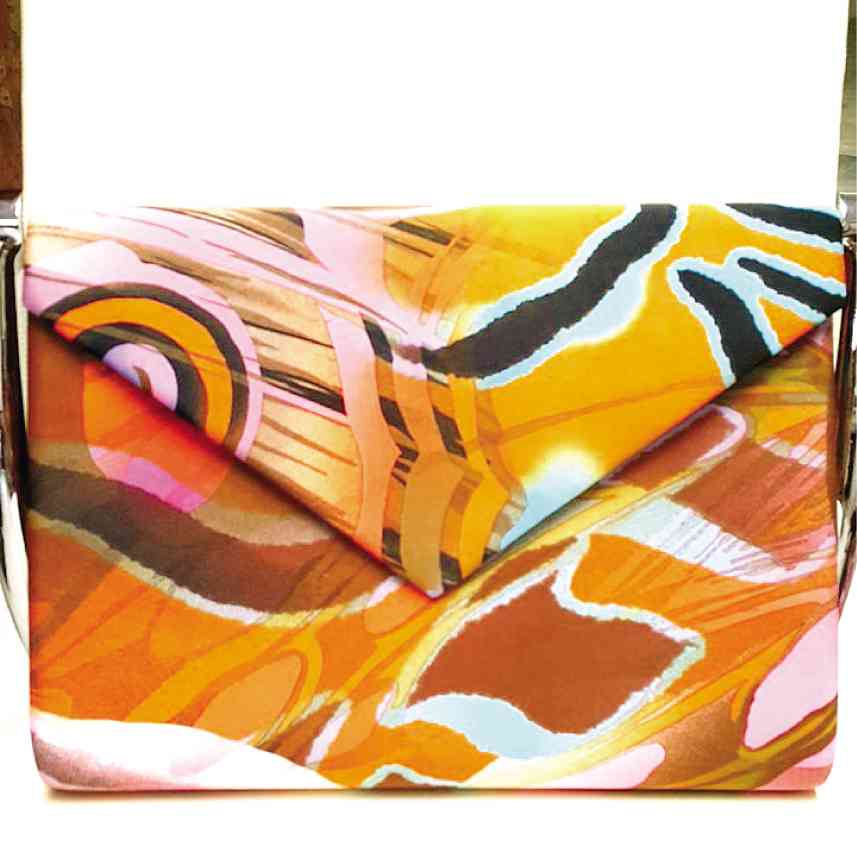Waste not, want not. This is what cousins France Lucero and Samantha Laurel practice as they recycle fabric scraps discarded by couturiers. From those scraps, they create one-of-a-kind fashionable clutches.
The fabric scraps, or what is locally called “retaso,” are sourced from two designers known to the cousins, bought for five hundred pesos per sack. It was Samantha, who works for her brother-in-law, designer Rajo Laurel, who told France of the sacks of retaso that usually end up in the trash.
“Our goal is to recycle/upcycle, and Rajo has been a helpful and good source,” says Samantha.
“We thought it’s such a waste of good materials, as most of the retasos are imported and of good quality,” adds France.
A self-confessed clutch lover, France took the fabric scraps that Samantha gives to her and makes the clutch designs herself. But it took them a while to find the right bagmaker who understands the concept and follows instructions.
After going through trial and errors with several bagmakers, they finally found a reliable one in Quezon City, a sewer whose stitching skills satisfy the requirements of the cousins.
Ready with their finished products, France and Samantha put up Sistele & Emette in June 2013, selling unique clutch bags made out of recycled quality fabric scraps.
“We started selling our clutch bags online, and we joined bazaars during our first year. The feedback was amazing,” shares France.
France and Samantha also got help from friends who sold the clutch bags in their shops .
Although bent on continuing to promote their products, day jobs and domestic life rank as higher priorities for the cousins, so they skipped the bazaars last year.
“But we plan to join [bazaars] again someday, when we get the time,” says France, who also dabbles in commercial modeling.
For the meantime, France devotes her time designing the bags, and selling them through Instagram, Facebook and other social media avenues.
Sistele & Emette is the cousins’ first business venture, but selling a product that they both like, and knowing that they are helping the environment, give France and Samantha the courage to take the plunge in entrepreneurship.
“I get advice from my husband, and from friends who own businesses, on what to do to,” says France.
Although their main materials are just fabric scraps, the fabrics are of good quality, some already have prints and designs, so France shares that they don’t really need to do much in designs as the fabrics are a character themselves.
“Since the retasos were recycled from the designers, our clutch bags are really unique. You won’t see them in other stores or sellers,” says France.
Back when they were starting, France said that they made the mistake of using wrong materials, like synthetic leather, which are not really advisable with the Philippine climate. But after finding the right materials that work well, Sistele & Emette finally opened for business.
It usually takes two weeks for their bagmaker to finish per batch of bags, ranging from 24 to 36 clutch bags of different sizes and designs. The excellent stitching speaks of the quality of their clutch bags, which are fashionable and durable enough to use for daytime or night activities.
“Most of our customers are young professionals and mothers. Since we started, almost all of our bags have already sold out, especially the ones from our Trella Collections, which are the mid-sized bags,” shares France.
They have also received personalized orders to provide bags for wedding entourages. They coordinate and give advice on what materials and designs would work well with the wedding motifs.
Recently, France shares that she also got inquiries and bulk orders from online sellers from the United States and Australia. But they make sure that the Sistele & Emette brand gets retained.
Aside from exporting their clutch bags and getting stalls in malls, France dreams of reaching out to a community where they can provide livelihood to the locals, especially the wives who stay at home.
She plans to someday approach nongovernment organizations to find communities where they can start their livelihood project.
“I have this dream of starting a project where we train community wives in bag-making, to give them a source of income, using recycled materials,” shares France.
“In our own little way we’d like to contribute thru redirection of waste and conserving the environment. Save the earth by going green,” Samantha adds.
France and Samantha took the initiative to create something good out of others’ scrap materials, knowing well that they are not only giving back to the environment, but hopefully someday, to the communities as well.
